November 30, 2007
Air Date: November 30, 2007
FULL SHOW
SEGMENTS
Bali Or Bust
View the page for this story
Living on Earth previews the upcoming conference on climate change in Bali, Indonesia where representatives of 180 nations will try to come up with a new international treaty dealing with global warming. Host Steve Curwood talks with Philip Clapp of the National Environmental Trust. (06:00)
Organic Fish Farming?
View the page for this story
The National Organic Standards Board wants to allow fish farmers to label their products “organic”. Living on Earth host Steve Curwood turns to Urvashi Rangan, senior scientist and policy analyst with Consumers Union, to find out just how organic a farmed fish can be. (05:30)
Edwards on Climate Change
View the page for this story
If he were president, what would John Edwards do to combat climate change? Living on Earth host Steve Curwood moderated the first-ever presidential candidates forum on global warming, where former Senator Edwards answered just that question. Tune in for the second installment of our coverage of one of the most serious issues the next commander-in-chief will face. (18:00)
King Bee
View the page for this story
In the world of social insects such as ants and honeybees, it's usually the females that rule the roost. But in the new animated film "Bee Movie," it's the male honeybees that take the cake. New York Times science writer Natalie Angier gives us the buzz on why Hollywood seems to have missed out on Bio 101. (07:00)
Emerging Science Note/Lava Land
/ Alex GutierrezView the page for this story
Yellowstone’s on the rise and molten lava’s on the move. Alex Gutierrez reports. (01:30)
Interpreting History
/ Jim WilliamsView the page for this story
African American Park Ranger Shelton Johnson reincarnates Sergeant Alizy Bowman, a Buffalo Soldier who helped guard Yosemite National Park just after its creation. Producer Jim Williams went to the park and has our profile. (08:30)
Show Credits and Funders
Show Transcript
HOST: Steve Curwood
GUESTS: Natalie Angier, Philip Clapp, Urvashi Rangan
REPORTERS: Jim Williams
[THEME]
CURWOOD: From Public Radio International—this is Living on Earth.
[THEME]
CURWOOD: I’m Steve Curwood. As delegates from across the globe are gathering in Bali for the United Nations Climate Change Conference, global warming’s picking up steam as an issue in the U.S. presidential campaign. Democratic hopeful John Edwards pledges to make America a green leader.
EDWARDS: Right now we’re sitting by the side of the road as foreign companies race ahead with developing green technologies. General Motors made the first modern electric car, but today Toyota and Honda lead the world in producing hybrids. Just last week I saw this headline: ‘Foreign Firms Envision Wind farms Dotting the U.S.’ Why should foreign firms be taking the lead in building wind farms here in America? Why is that not being done by American firms?
[APPLAUSE]
CURWOOD: John Edwards and more this week on Living on Earth. Stick around!
ANNOUNCER: Support for Living on Earth comes from the National Science Foundation and Stonyfield Farm.
[THEME]
Bali Or Bust
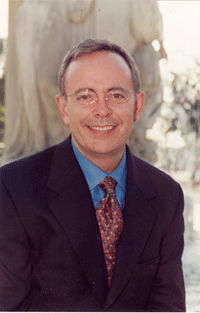
Philip Clapp, President of the National Environmental Trust. (Photo: National Environmental Trust)
CURWOOD: From the Jennifer and Ted Stanley Studios in Somerville, Massachusetts—this is Living on Earth. I’m Steve Curwood. As December begins, delegates from just about all of the world’s nations are gathering in Bali, Indonesia at a UN conference to address global warming. The Kyoto Protocol that was negotiated ten years ago will gradually expire over the next few years, and at issue is what will replace it.
Joining me from our studio on Capitol Hill in Washington is Philip Clapp. He’s president of the National Environmental Trust and will be in Bali for the climate negotiations. Hello, Phil!
CLAPP: Hi, Steve.
CURWOOD: So, what’s supposed to happen at Bali?
CLAPP: Bali is the launch of a critical two-year negotiation to complete a new international global warming treaty. And this will really be the world’s last chance to get global warming pollution under control or we’re going to face the worst impacts. We’re looking at most recent data showing 250 million people in Africa facing water shortages, 150 million people in Asia facing food shortages and hunger, and potentially as many as 100 million new refugees every year created by storms and extreme weather events. That’s the entire population of Mexico every year.

Philip Clapp, President of the National Environmental Trust. (Photo: National Environmental Trust)
CLAPP: This is the only process by which the world can actually come to a worldwide agreement to cut emissions. And this is something that literally all countries have to do. But leaders like the United States, with the wealth, the technology, and the largest polluters, have to take the lead. We’ve got to stop the growth in the world’s emissions in the next ten to 15 years, and we’ve got to cut them by 80 percent within the next 30 to 40 years. That’s got to start now.
CURWOOD: So, President Bush has objected to mandatory limits on greenhouse gases. When he convened the global warming summit of some of the biggest emitters in Washington back in September, he said each nation should independently set its own targets and develop the tools and technologies that work for its own particular situation so it doesn’t undermine economic growth. How compatible is the U.S. position with what’s going to happen in Bali and what are the prospects—if it’s incompatible in your view—what are the prospects of seeing a change?
CLAPP: The Bush administration continues to be the odd man out in the world’s efforts to control global warming pollution. As far as the Bush administration’s proposals—the president is really just rolling out again exactly the same treaty proposal that his father made in 1992 that failed. Kyoto was never intended to solve the problem all by itself. It was intended to be a first step in the world developing the complicated structures necessary to reduce our fossil fuel use. And those foundations are being laid right now. The question is: will we take them far enough in this round of negotiations starting in Bali to actually solve the problem?
CURWOOD: So, how do you bring in the rapidly developing countries—the big ones like China and India—into the next round of what follows Kyoto with mandatory limits on greenhouse gases for those countries as well?
CLAPP: I think what you’re going to find is a treaty that I would call Kyoto Plus. You’ll have the core of solid emissions reduction targets economy wide for big countries—big, wealthy, developed countries. But you’ll have more flexible mechanisms for more developing countries whose economies are very, very different.
The key issue, for example, with China is the growth of electricity production and therefore the burning of coal, which is the largest single fossil fuel producer of global warming pollution. China can take major steps to restrain the growth of its electricity sector, restrain the growth of coal use in China, and actually out of the treaty, they could get financial benefits from other countries for doing that. So those are the kind of flexible approaches that I think are going to attract a number of developing countries.
CURWOOD: So, if I understand some of the things the Bush administration has said is that they feel it’s real important for China and India to be involved, and China and India say well, they don’t think they should really take a stand on having limits on their emissions without the U.S. being involved. It seems to me like there’s some kind of a standoff, that things are just stuck.
CLAPP: There is a bit of a standoff and you know, China and India have a point when they say
‘well, you know, the United States produced 50 percent of the pollution that’s in the atmosphere, don’t you think you have a responsibility to at least get started before you ask us to clean up the mess you made?’ And that’s a reasonable argument. At the same time, China and India are growing massively in terms of their emissions and the growth of those emissions has to be slowed down, so they’re going to have to step up to the plate, too.
CURWOOD: You’ve been working on climate change negotiations for years so let me ask you—what’s your biggest fear about these upcoming negotiations in Bali?
CLAPP: That the rest of the world will blink in the face of Bush administration opposition, and not create a clear timetable that in the very short space of two years—between now and December 2009—can come up with a binding treaty. And binding targets are the only things that have begun to reduce worldwide emissions. So my biggest fear is that the Bush administration will block the ability to negotiate an effective new treaty.
CURWOOD: What’s the best we can hope for then out of Bali in your view?
CLAPP: The best we can hope for actually, is that the Bush administration blinks and there have been indications in past negotiations that if put on the spot, they might back off. In 2005 in Montreal at negotiations like this where binding targets had to be part of a document, the administration first staged a walkout and then when the press was very bad the next morning, the White House turned around and said ‘why don’t we just quiet down and let the thing go through.’ I think you might see a similar thing happen at Bali. I think it’s very hard for the president—having gone to the G8 and agreed that a new international treaty should be struck by 2009—to bring the whole house down at the first negotiations. But it’s not impossible.
CURWOOD: Phil Clapp is the president of the National Environmental Trust. Thanks for taking the time with us, Phil.
CLAPP: Thanks for having me, Steve.
CURWOOD: And see you in Bali! More about climate change coming up from a presidential candidates forum, but first—fish.
Related links:
- United Nations Climate Change Conference in Bali
- National Environmental Trust
- The White House on climate change
[MUSIC: Various Artists/ Zen Lemonade “Die Ashanti” from ‘Mana Medicine’ (Liquid Sound—2005)]
Organic Fish Farming?
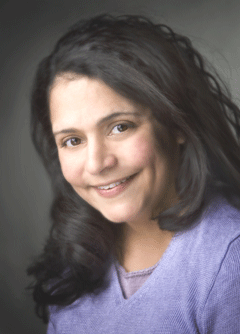
Urvashi Rangan, senior scientist at Consumers Union. (Photo: Consumers Union)
CURWOOD: Fish farming—or aquaculture—is a billion dollar business in the U.S. these days. And as health-conscious consumers increasingly demand organic products, fish farmers want a piece of that lucrative market as well. The Aquaculture Working Group of the National Organic Standards Board has made a proposal for the organic labeling of farmed fish. But critics say industry is overrepresented in that body, and as a result the proposal falls short of what’s needed for consumer protection.
Urvashi Rangan is senior scientist and policy analyst at Consumers Union. Ms. Rangan, welcome back to Living on Earth.
RANGAN: Good to be here, Steve.
CURWOOD: So, when I think of organic—I’m thinking an organic fish ought not to have what—any mercury or PCBs and it’s been fed the purest of pure organic food. What does the Aquaculture Working Group’s report recommend exactly?
RANGAN: Steve, what you think organic ought to be is exactly what our survey shows most consumers think it ought to be. Unfortunately, the report from the Aquaculture Working Group wants to allow—first of all—up to 25 percent non-organic feed—that is fish meal farmed out in the ocean, which could be contaminated with PCBs or mercury. The other thing that the Aquaculture Working Group is recommending are the use of what’s called open net pens. These are basically open nets that are put in the ocean or other bodies of water, where fish are raised, but all the water is exchanged nonstop and so the waste that’s created in these net systems basically washes out to sea.

Urvashi Rangan, senior scientist at Consumers Union.(Photo: Consumers Union)
RANGAN: Absolutely. There are a variety of fish that are raised in what are called ‘closed systems.’ They are either tanks or contained in ponds. Shrimp and tilapia are examples of that. And in fact, these are also vegetarian fish. And these fish can be fed a diet of 100 percent organic feed. There are some fish today that should be eligible to be labeled as organic, but we think a line needs to be drawn in the sand between those types of fish that are vegetarian and can be raised in systems that don’t pollute. Let them go organic. And let’s not allow fish that eat less than 100 percent organic feed, that could be contaminated, and that could pollute the ocean or other water bodies in their farm systems, let them not be labeled organic.
CURWOOD: Now, what are some of the positive impacts that granting the organic label to fish farming could have? What would it do in terms of inspiring better environmental stewardship, do you think?
RANGAN: Well there are a lot of great things that could happen actually, and with shrimp production for example—about 70 percent of the shrimp that we get in this country is imported. Lots of problems with shrimp coming in from China. The great thing about shrimp production happening in an organic way is of course, the oversight that you have in terms of what can be used. That is, no drugs, no antibiotics, and really an assurance system that guarantees that those products meet a set of standards. That’s just one great advantage of organic production, not just for shrimp, but for any kind of fish.
CURWOOD: Now, by the way, shouldn’t any wild-caught fish be considered organic or not?
RANGAN: While on some level it makes sense in that, aren’t they the most natural fish because they come from the wild? If you think about it, to be organic on top of wild adds absolutely no value. The other issue is that you can’t control production systems in the wild and organic is a controlled production system. You want to control the inputs, the outputs, the waste, the feed, and those are really the central tenets to organic production. And for those reasons, wild-raised animals aren’t really eligible to be labeled as organic.
CURWOOD: And, how about a little bit of advice to consumers. How important is it for consumers to seek out organic fish products?
RANGAN: Well, at this time, the organic seafood that is on the market really doesn’t have to meet any set of standards. Consumers should not pay more for the organic fish that they see on the market at this time. It could be loaded with contaminants, for example, and it could even be raised with antibiotics and other drugs. We simply don’t have standards in this country for those products to meet. So that’s the first thing. The second thing is that when the standards are finally completed, which will likely be at least a year from now, at that point, consumers may very well have some meaningful options when it comes to organic fish. But it really all depends on what the USDA decides to do and whether they’re going to weaken those standards so that all those fish can swim to the organic label, or whether they really just allow that label to be used on the fish that deserve it.
CURWOOD: Urvashi Rangan is a senior scientist and policy analyst at Consumers Union and director of GreenerChoices.org. Thank you so much, Urvashi!
RANGAN: Thank you.
Related links:
- Urvashi Rangan and other companies' letter to the National Organic Standards Board
- The Aquaculture Working Group's report for the National Organic Standards Board
[MUSIC: Various Artists/ Zen Lemonade “Die Ashanti” from ‘Mana Medicine’ (Liquid Sound—2005)]
CURWOOD: Last week, we heard Senator Hillary Clinton’s plans to combat global warming delivered at a presidential forum. Coming up, former Senator John Edwards. Keep listening to Living on Earth.
Edwards on Climate Change
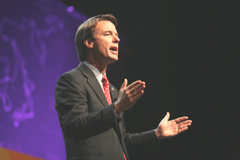
(Photo: Laura Kleinhenz)
CURWOOD: It’s Living on Earth. I’m Steve Curwood. On November 17th, I was proud to represent Living on Earth as the moderator of the first-ever presidential forum on global warming. This was a chance for the presidential candidates to lay out how they would respond to the challenge of global warming if they make it to the White House.
The Republican and Democratic candidates were all invited. Only three—all Democrats—showed up: Senators Hillary Clinton and John Edwards, and Representative Dennis Kucinich. Each of the candidates gave an opening statement, and then was questioned by a panel—Mary Nichols, chair of the California Air Resources Board, David Roberts of the online magazine Grist, and me. Today we are airing excerpts from Senator John Edwards’ appearance.
[APPLAUSE]
EDWARDS: Thank you. Thank you. You all have been at the forefront of fighting global warming, and this forum is another one of many examples of your doing what’s necessary to raise awareness about this issue, raise awareness about this crisis, and to inject it into the center of the debate, which it should be in this campaign in this election. We need a president who will be straight with the American people about the challenges and the opportunities that all of us face when it comes to global warming.
[APPLAUSE]
EDWARDS: Two weeks from now, America will send a delegate to the United Nations Conference in Bali with no ideas and no solutions. It is embarrassing for the United States of America to be in that position.
[APPLAUSE]
EDWARDS: Throughout this campaign, I’ve been very clear about what I think we need to do to face this challenge. I’m proud of the fact that I came out very early and very aggressively about what we need to do to attack global warming. I said then that we need to cap greenhouse gas pollution starting in 2010 with a cap-and-auction system and that we need to reduce it by 20 percent by 2020 and 80 percent by 2050, that we need to lead the world in a new global climate treaty, that we need to meet the demand for more electricity through efficiency for the next decade, instead of producing more electricity. And we need to create a new energy economy fund to support U.S. research and development in energy technology and other advances by auctioning off $10 billion of greenhouse pollution permits and repealing $3 billion in oil company subsidies.
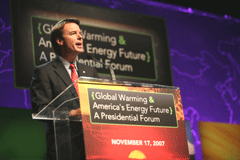
Senator John Edwards at the Presidential Forum on Global Warming and America's Energy Future. (Photo: Laura Kleinhenz)
EDWARDS: Now, I have heard some politicians talk about a cap-and-trade system as not going far enough, as a way to avoid the word ‘tax.’ But I believe that candidates running for president need to be straight with the American people about exactly what we’re proposing. We’ve had enough doubletalk, we’ve had enough politician talk. We need to be honest with people. The truth is that carbon caps will have an impact on the cost of fossil fuels. Anyone who pretends that’s not true is not being straight with America. And by the way, it is a political strategy that is absolutely doomed to fail because we are never going to get the change we need by pretending that this is going to be easy and that no sacrifice will be required. The truth is—
[APPLAUSE]
EDWARDS: The truth is that the big change we need will not be easy. It’ll take the sustained commitment of a generation of Americans. The American people understand that, and we need a president who will challenge them to be part of the solution, not patronize them by pretending that the problem doesn’t exist or that some politician can solve it for them. Right now, we’re not just turning a blind eye to global warming, we’re also missing an opportunity to lead the world and reclaim the spirit of American ingenuity that has driven great advances and helped us overcome great challenges in the past.
Right now, we’re sitting by the side of the road, as foreign companies race ahead with developing green technology. Bell Labs invented the solar cell in New Jersey in 1954, but today, 90 percent of solar panels are manufactured overseas. China’s even produced a solar billionaire. General Motors made the first modern electric car, but today, Toyota and Honda lead the world in producing hybrids. Just last week, I saw this headline: ‘Foreign Firms Envision Windfarms Dotting The U.S.’

Los Angeles' Wadsworth Theatre shortly before the climate change forum began. (Photo: Laura Kleinhenz)
EDWARDS: Why should foreign firms be the ones taking the lead in building windfarms here in America. Why is that not being done by American firms?
[APPLAUSE]
EDWARDS: If we take the steps that I propose, American entrepreneurs and manufacturers can lead the world in developing the green technology we need to generate clean, reliable energy and to use it more efficiently. We need to let entrepreneurs try a thousand different approaches, not centrally-planned government handouts. Let me give you a few examples of exactly what I mean.
First, I will cut carbon welfare subsidies for oil companies to raise money that will be invested in renewable fuels like wind, solar, biofuels, and turbo charging our energy efficiency technology. Second, I’ll spark a new era of innovation and competition by modernizing our electricity grids. New, smart grids will let entrepreneurs create renewable energy and then to sell it back into the grid. They will also be safer, more efficient, and more reliable. Third, I will seed innovation by giving low-interest loans to homeowners and small businesses for new technologies like solar, hot water, and electric systems. These systems are expensive, as all of you know, up front, but they pay off for families in the long run, particularly when excess power can be sold to their neighbors. Fourth, I’ll create a new market for energy efficiency. Right now, utilities profit from selling electricity, but have absolutely no incentive to help their customers use less energy.
Now, don’t get me wrong. Getting to the new energy future that all of us want to see happen for this country that we love so much will not be a cakewalk. It’s true that the steps we have to take will cost money. It’s true that some of these steps we need to take will mean higher energy prices. And given the scope of the crisis, there may be further steps that we need to take down the road. Every time we get new, up to date, scientific information, it indicates that global warming is more of a crisis than we thought before. But, in the end, families can come out ahead if they switch to renewable fuels, use energy efficiently and make smaller sacrifices in their own lives. I think we’re ready for that. I think, actually, the American people are ready for a president who calls on them to sacrifice and asks them to be patriotic about something other than war.
[CHEERS AND APPLAUSE]
CURWOOD: After the prepared remarks, the panelists—Mary Nichols, David Roberts and I—questioned the former Senator.
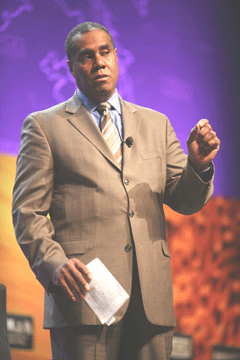
Steve Curwood moderated the forum. (Photo: Laura Kleinhenz)
CURWOOD: Thank you Senator.
EDWARDS: Thank you.
CURWOOD: You’re calling on people to sacrifice. How do we get there? How, as president of the United States, how do you get America to sacrifice the way you feel that we should in order to accomplish your objectives?
EDWARDS: Here’s my response to this. Having now spent—it seems like the last eight years campaigning around the country—I’ve been talking, but not just talking, I’ve been listening. The American people are actually hungry to do something as a national community. The problem is no one has asked them to. I mean, after September 11th, George Bush said, ‘go shopping,’ right? What Americans want, and you can see it, the evidence is everywhere. I mean, really—you saw the response immediately after September 11th of the American people. I’m not talking about the government. You saw what happened when the hurricane hit the Gulf Coast. I mean, the government was an incredible mess, but Americans went down there, contributed, volunteered. I took 700 college kids who gave up their spring break, literally, just to go to New Orleans and help rehabilitate houses. I mean, I think there is a huge hunger and desire in America to take action. And I still remember and I know a lot of you do, the famous John Kennedy speech, ‘Ask not what your country can do for you.’ Well, that’s where we are today. We need a president who will look America in the eye and say: ‘we’re not going to be careful anymore, we’re not going to be politically cautious, we’re not going to look at polls to figure out what I’m supposed to say to you.’ We know what needs to be done—
[APPLAUSE]
EDWARDS: -- and I’m going to call on you to be willing to sacrifice, to make America what it’s capable of being. But I will say, I think, that we have to recognize something which will probably creep into every answer to every one of your questions, which is—the government has become corrupt and we need to be honest about that.

(Photo: Laura Kleinhenz)
EDWARDS: Why does America not attack global warming in the way that we need to? We know why we haven’t—oil companies, power companies, gas companies, and their lobbyists in Washington, D.C. and all of these big challenges that America faces, it’s going to be impossible to be successful in responding to those challenges, unless we have a president who tells America the truth and says to America: ‘we don’t have to stand quietly by and let this narrow, well-financed group of interests run your government.’ We don’t.
[APPLAUSE]
EDWARDS: We can actually go out and reclaim this democracy and when we reclaim this democracy, when we reclaim the democracy—together, I’m not talking about just me—when we, when somebody believes, when the president of the United States actually believes in the power of America, not just the power of the presidency, who believes that the power’s out here in communities like this and what we need to do is go out, galvanize America and go into Washington, D.C., reclaim this government, reclaim this democracy, and take the power out of the hands oil companies, gas companies, Exxon-Mobil, and their lobbyists in Washington, D.C.
[CHEERS AND APPLAUSE]
EDWARDS: We can beat these people, but we have to be willing to take ‘em on.
[APPLAUSE]
NICHOLS: Okay.
CURWOOD: Thank you, Senator. Mary?
CURWOOD: Mary Nichols.
NICHOLS: As President Edwards, in addition to taking on the oil companies and the coal companies, etc, I think you’re going to find that in talking about sacrifice and building that mandate for the shared sacrifice that you referred to, that the burdens and the benefits are not necessarily spread equally across this country, geographically or in terms of people’s careers. And in certain parts of the country where coal is something that for people there is the only or the major source of jobs, maybe the only or major source of fuel for their power plants that they, that they live by, that making that switch may be a little tougher than it is for other places. So, how do you address that in terms of building and bringing together the kind of coalition that you’re going to need to get this done?
EDWARDS: Well, let me answer the question you’re asking directly, but I also want to broaden it to the bigger question of how we can use this transition to also help in more economically deprived areas in America. As to coal—I came out very early and very aggressively saying that America should not be building more coal-fired power plants until we have the ability to sequester the carbon—
[APPLAUSE]
EDWARDS: -- and to store it and we have the capacity to do it. And I do think, for those families and those communities and those regions that are most impacted, we should use, and we’re making the polluters pay, which should generate a minimum of $30 billion in the cap-and-trade system, we should use a chunk of that money to go in to revitalize those communities, to help them, to help them transition, to help support the families. But I think we can do much more than that.
As we make this transition from a carbon-based economy to a green economy, I think all of us believe if we do it in a smart way, we can generate a minimum of a million new jobs and maybe upwards of two million new jobs. And the question is: where will those jobs be located? And my view is we ought to work very hard to generate those jobs and to generate that economic development in the places where people are suffering the most economically.
[APPLAUSE]
EDWARDS: In poor rural areas, in poor inner-city areas, I mean, clearly, this is a great opportunity to create jobs—good, middleclass jobs, that will be able to support a family. And when we talk about the sacrifices that we’re, that I, as President, will be asking Americans to make, we also have to make sure that they understand that there are extraordinary opportunities here. We can make certain that those opportunities are generated in the places where people are struggling the most and a lot of you know this already—poverty is a huge cause in my own life personally and I believe it’s a national embarrassment that we have 37 million people who wake up every day worried about feeding and clothing their children.
[APPLAUSE]
EDWARDS: We have 35 million, according to a report that literally came out a couple of days ago, we have 35 million people who were hungry last year. In America? How in the world are we going to tolerate this? We have to do something about it, and we can use this transition to a green economy to accomplish at least part of that.
CURWOOD: Quick follow up, Senator. As a quick follow-up to this—did I get this right? If the rights to pollute—to release carbon—were auctioned off, you’d take those funds to pay for the rebuilding of the lives of peoples who will have their jobs or their industries or their neighborhoods dislocated by the reduction of carbon in our economy?
EDWARDS: A portion of it. Now a portion of it, a sizeable chunk of it is going to go to invest in wind, solar, cellulose-based biofuels, to the making certain that American car companies are building the most innovative vehicles on the planet. And to making sure that we’re developing the technologies that we need to develop to make the transition. But some of that money can clearly be used because beyond that—what I’ve proposed is about 13 billion of the 30 go into that—beyond that, a sizeable chunk of money can be used to help these communities—
CURWOOD: Enough so that no one would lose their standard of living?
EDWARDS: Enough so that we would provide all the support we can. I can’t make that promise. I don’t know if that’s true or not.
[APPLAUSE]
ROBERTS: Thank you, Senator.
CURWOOD: David Roberts of Grist Online.
ROBERTS: We’ve been talking these last two questions about equity and fairness inside America during the transition but the question of equity and fairness internationally is even more stark—the divide between winners and losers. A certain amount of change, climate change, is inevitable already built into the system, and those impacts are going to hit the world’s poor and vulnerable very hard. There’s nothing we can do at this point to prevent those changes. What can America do to help lift up those parts of the world that are going to be hit worst by the changes that we had a substantial hand in creating?
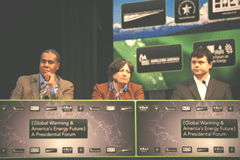
(L-R) Moderator Steve Curwood and panelists Mary Nichols (California Air Resources Board Chair) and David Roberts (Grist.org.) (Photo: Laura Kleinhenz)
But I think first of all we have to be willing to invest in a way that we’re not investing today. And we know some of the things that need to be done—you know, to raise up roads, bridges, maybe some walls need to be built to provide protection. And we know some of the more drought-resistant irrigation techniques, more drought-resistant crops. I mean, I think those are some of the things that in the third world America needs to be developing.
But can I just go for a moment go outside global warming? But it’s a connected issue. It is, you talk about the poorest countries in the world being the ones that will struggle and suffer the most as a result of climate change. But that’s true of everything. I mean, they suffer the most in every conceivable way. Half of the planet, three billion people, live on $2 or less a day. The abject poverty that exists in Africa, in parts of Asia, in some parts of Latin America, are heartbreaking. And I think if most Americans saw it, they wouldn’t think it’s tolerable. It’s not tolerable. And the idea that America can be a leader in isolation on global warming without actually being a moral leader on all the big issues that face the world, I think completely misunderstands what leadership is.
[APPLAUSE AND CHEERS]
EDWARDS: And if I—and I don’t want to stray too far from the subject, but if I can just take 60 seconds. Some of the things that America should be doing: we should be leading an international effort to make education available to 100 million children in the world who have no education.
[APPLAUSE]
And particularly in Africa, but not just Africa. We should be helping stop the spread of disease; we should have at least $50 billion over the next five years invested in HIV/AIDS and making certain that education is being provided and the treatment is being provided around the world. We should be, simple things like clean drinking water and sanitation—I know myself from the work I’ve done with the International Rescue Committee in Africa—would make an enormous difference, an enormous difference. Things that all of us take for granted—and economic development. Things like micro-lending and micro-financing. The only way America is going to be a credible leader on huge issues, crisis issues like global warming, is the world has to see us as a force for good in the world again. They need to see America doing big and important things, not just for ourselves, but for humanity. Thank you all very much. Wonderful to be with you! You’re terrific!
CURWOOD: Senator John Edwards at the Presidential Forum on Global Warming and America’s Energy Future in Los Angeles. To listen to the entire presidential forum, go to our website loe.org. In the weeks ahead we’ll hear from Representative Dennis Kucinich. The event was organized by groups affiliated with the League of Conservation Voters, the Center for American Progress, the Natural Resources Defense Council, and the Presidential Forum on Renewable Energy. And special thanks to panelists Mary Nichols of the California Air Resources Board and David Roberts of the online magazine Grist.
Related links:
- Rough transcript of "A Presidential Forum: Global Warming & America¹s Energy Future"
- John Edwards' Energy and climate plan
- Dennis Kucinich's Energy and climate plan
- Hillary Clinton's Energy and climate plan
- Forum panelist and Grist Magazine staff writer David Roberts' reflections on the event
[MUSIC: Radiohead “There There” from ‘Hail To The Theif’ (Capitol Records—2003)]
CURWOOD: Just ahead, gender bending in Hollywood—at least for insects. Keep listening to Living on Earth.
ANNOUNCER: Support for the environmental health desk at Living on Earth comes from the Cedar Tree Foundation. Support also comes from the Richard and Rhoda Goldman Fund for coverage of population and the environment. This is Living on Earth on PRI: Public Radio International.
King Bee
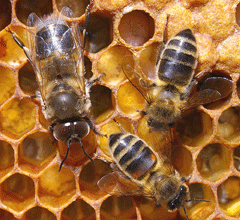
A close-up of a drone (a male honeybee) and two (female) workers. (Photo: Flickr/ Max xx)
CURWOOD: It’s Living on Earth, I’m Steve Curwood. One of the most publicized movies to hit the multiplex this season is Jerry Seinfeld’s new project—Bee Movie. It features Jerry finding his place among an army of male bees who defend the hive, stingers at the ready, and bring home the bacon—I mean nectar.
This scientifically flawed view of bee society perplexed New York Times writer, Natalie Angier. Ms. Angier points out that a hive is actually headed by a queen. Virtually all the work is done by armies of she-bees, and they’re the ones that sting—not the males, known as drones. Ms. Angier joins us from Washington. Welcome to Living on Earth, Natalie.
ANGIER: Glad to be here.
CURWOOD: So, let's start by listening to a clip from Bee Movie, which was recently released.
[CLIP FROM BEE MOVIE: MALE VOICE SHOUTS ‘ALRIGHT, LAUNCH POSITIONS!’]
CURWOOD: Barry B. Benson— Jerry Seinfeld—prepares to take flight with a squad of male honeybees to forage for nectar.
[SWORDS CLINK, MALE VOICE SHOUTS ‘BLACK AND YELLOW . . . OKAY LADIES, LET'S MOVE IT OUT!’ SOUNDS OF FIRING]
CURWOOD: Ok, Natalie, now as I understand biology, about the only thing accurate in that scene is the last line, ‘alright ladies, let’s move it out.’ But otherwise, the guys, I don’t think they go out and get nectar and they certainly don’t have stingers.
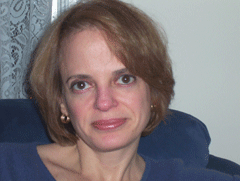
Natalie Angier (Photo: Katherine Angier)
CURWOOD: So, okay. Why are there male bees then, anyway?
ANGIER: They’re basically packets of sperm with wings is what they are. I mean, they are born strictly to inseminate a queen bee. So the male bee—what does he do? Well, okay, so during the mating season he leaves the hive and he goes off to basically what amounts to a kind of a bee singles bar and tries to find a queen who will accept him and if the queen does accept him and if he mates with the queen—if he’s lucky enough to do that—basically he deposits his little organ in the queen, in the same way that a worker bee, when she stings someone, will die, he will die after doing that. In fact, it kind of pops off and you can hear them dropping to the ground after this happens. So, this is his sole goal in life. It’s not exactly a happy life and the ending is bound to be tragic. But I think that there could have been more comic possibilities in that if someone had wanted to—
CURWOOD: Yeah. This sounds so funny, I mean, here a—

A close-up of a drone (a male honeybee) and two (female) workers. (Photo: Flickr/ Max xx)
CURWOOD: I mean, you can see these guy bees out at the single’s bar. What is the bar called “Bees Knees” or something?
ANGIER: (laughs) That’s pretty good!
CURWOOD: (laughs) You know, and they’re going about their beesiness. Yeah, I think this could be quite funny. Instead, Hollywood can’t countenance the fact that the hive runs on female power.
ANGIER: Females run the show. Definitely. And this is also true of ants, the other big social insect. That of course, when Woody Allen made the movie Ants back in 1998 they did the same thing and actually, A Bug’s Life is also about ants and they made all the main characters male: the soldier ants, the worker ants—all of which would be female in a real ant’s nest. So, they keep doing this over and over again.
CURWOOD: Okay, Natalie. Why?
ANGIER: I think it’s because. Well, you know, the thing about insects—social insects like the bees and the ants—is that because they have this highly organized society, it seems human. So this is kind of the human idea here is ‘oh, this is a society like ours, and we’re going to use this as a device to talk about issues of autonomy, of freedom, of control, social control. All of these things you might want to explore. But, you don’t want to necessarily have a limit to using only female characters to do this. So they just decided, ‘well we’ll take this part of the biological reality and toss the rest away.’ I think it’s just because Hollywood feels safer making things male-directed, male-centered.
CURWOOD: You don’t suppose there’s a stinger envy, do you?
ANGIER: (laughs) That’s good! I wish I’d thought of that one. Yeah, that might be something about—I mean the stinger does seem so much like a weapon, like something you associate with quintessential maleness. Um, but I don’t know. I don’t know what Hollywood’s calculations are and I don’t know how much of it is just kind of habit. And how much of it is fear or how much of it is calculated. I really can’t say.
CURWOOD: So, biological accuracy unimportant. You know, kids have limited exposure to science education. I mean, why take such a great outlet as this multimillion-dollar film and use it to spread misinformation to them?
ANGIER: Because I think Hollywood considers itself a source of entertainment, not education. And you know, okay, I can understand that. And some of these movies, they’re kind of clever. But I think it would be even more clever if they actually did explore some of the real themes that are going on there. Now, it is true. It would be interesting. If someone wants to talk about a social insect where both males and females do all the work together, we’re talking about the termites there. So, if we want to have a movie about termites—that would be more legitimate to talk about these kinds of roles being distributed a little bit more equitably.
CURWOOD: Well, sooner or later maybe Natalie Angier is going to write this movie.
ANGIER: Ha-ha. There’s an idea (laughs)
CURWOOD: (laughs) Natalie Angier writes for the New York Times. Her article is called “In Hollywood Hives, the Males Rule.” You may also know her book called “Woman: an Intimate Geography.” Natalie, thanks so much for taking this time.
ANGIER: Thanks for having me on. I enjoyed it.
[CLIP FROM BEE MOVIE: BARRY SAYS ‘YOU KNOW DAD, THE MORE I THINK ABOUT IT, THE HONEY FIELD JUST ISN’T RIGHT FOR ME.’ FATHER RESPONDS ‘AND YOU WERE THINKING OF WHAT, MAKING BALLOON ANIMALS? THAT’S A BAD JOB FOR A GUY WITH A STINGER. JANET, YOUR SON’S NOT SURE HE WANTS TO GO INTO HONEY! . . .]
Related links:
- Bee Movie website
- Natalie Angier's website
CURWOOD: Coming up, a park ranger channels a Buffalo soldier in Yosemite National Park. But first this note on emerging science from Alexandra Gutierrez.
Emerging Science Note/Lava Land
GUTIERREZ: In America's heartland lies one of the world's largest ‘super volcanoes.’ Its last eruption was 1000 times more powerful than that of Mt. St. Helens, and it’s capable of covering half the continent in volcanic ash. Now, this super volcano is rising up from the ground.
No, that's not the plot of a holiday blockbuster. It's the findings of University of Utah seismologists. Yellowstone National Park hosts one of the world's largest volcano fields. Its many geysers and hot springs suggest that the park lies above a ‘hot spot,’ an area of the earth's crust that has experienced volcanic activity for an incredibly long period of time – in this case about four million years.
Now scientists say that parts of the park floor are rising at record rates. Since 2004, the floor of the park has risen approximately three inches per year. Usually, the elevation changes no more than a fraction of an inch.
Researchers believe that this movement is due to a massive injection of molten rock six miles beneath the park's surface. They used a computer simulation to reveal that a slab of magma the size of Los Angeles has been putting pressure on the area and likely causing the uplift.
But this activity shouldn't be cause for alarm. The rate of land uplift has slowed, and there is no other evidence that Yellowstone will be erupting anytime soon. Instead of fretting about hot lava, tourists to the park can focus their attention on keeping their distance from the bears.
That's this week's note on emerging science. I'm Alexandra Gutierrez.
Interpreting History
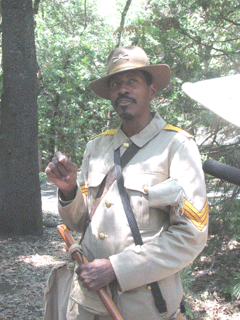
Park Ranger Shelton Johnson becomes Sergeant Alizy Bowman to tell the history of the beginnings of Yosemite National Park. (Photo: Melissa Frank)
CURWOOD: Two hundred and fifty million Americans visit our national Parks every year. We have nearly 400 of them in all. Most of them are patrolled by rangers who protect the park and talk about its geography, geology, plants and animals. And some feature interpretive rangers, who take on a character to help visitors understand the unique history of the park.
One such ranger welcomes visitors to one of the most beautiful spots in the West, Yosemite. Jim Williams of member station KUMN caught up with this ranger in action.
JOHNSON: Have you noticed there’s just so much sky here? I think there’s a overabundance of sky in Yosemite. I wonder if the sky needed to get a permit from the government to have so much of itself over here.
WILLIAMS: South Carolina native Sergeant Alizy Bowman stands surrounded by fifteen or so wide-eyed Yosemite visitors. He’s decked out in his tan 9th cavalry finest. The crossed swords on his brimmed military hat flash in the bright sunlight.
JOHNSON: So now I’m going to tell you why it is the military was brought in here. When Yosemite was created as a National Park on October 1st, 1890, Congress neglected a little thing that ain’t so little. They forgot to supply adequate funding for the protection of the park. This woman’s in shock. She can’t believe the government would not see that clearly was an issue. If you have a national park and you don’t have someone to protect it, it could be a problem. Because how many of you folks think that Yosemite is a place beyond value?
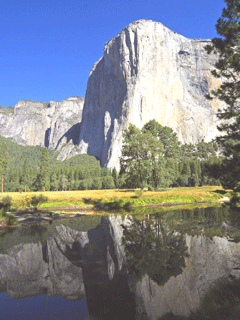
One of Yosemite's best known landmarks: El Capitan (Photo: Jon Sullivan)
JOHNSON: And the people in this county—Mariposa County—are used to coming up into these mountains and getting what they want, what they need to help their family from these mountains. People come up here, and have for years, to shoot the game, to cut the trees down for firewood, and all of a sudden, the government steps in and says that there’s a line right here. Right here. And that line, on this side, is Yosemite National Park. On that side is Mariposa County. Now how many of you see that line? If you from Mariposa County, there ain’t no line there at all.

Park Ranger Shelton Johnson becomes Sergeant Alizy Bowman to tell the history of the beginnings of Yosemite National Park. (Photo: Melissa Frank)
JOHNSON: I gotta ask you folks something: is there a nice way to call someone a timber thief and a poacher? And if we were in Mississippi, or Alabama, or Georgia, and I was gonna call a white man a timber thief and a poacher, ain’t there a word for that down south? Oh, I remember, it’s called suicide.
[LAUGHTER]
WILLIAMS: The laughter turns to quiet, and there’s a moment here where Johnson’s audience seems to consider something a bit deeper, but the ranger moves them on quickly to another spot, playing his Native American flute along the path.
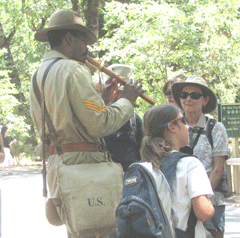
Sergeant Alizy Bowman, aka Ranger Shelton Johnson, plays his flute for Yosemite National Park visitors. (Photo: Melissa Frank)
[FLUTE MUSIC]
WILLIAMS: He stops, points to a place for the kids to sit in the shade, and Alizy Bowman is back.
JOHNSON: Man, do you think I got a bit of a attitude?
WILLIAMS: He explains that he’d had an attitude growing up in Spartanburg, South Carolina, which didn’t go over well in the late 1800s. It’s a big part of the reason he ended up a Buffalo Soldier. His father, he says, told him to leave home as a teenager and walk north, which he did. Then he went west, eventually ending up in Fort Robinson, Nebraska, where he was extended an offer to join the Army. Bowman says as he held the pen to sign his enlistment form, he remembered that his brother had died in the Civil War, after having escaped slavery in South Carolina.
JOHNSON: My brother had done the same thing I was about to do: make a mark on a piece of paper. And that’s what I remembered. And I heard in my head this: (Singing) There’s a man goin’ round takin’ names. There’s a man goin’ round takin names. He has taken my brother’s name, and he’s left my heart in pain. There’s a man goin’ round takin’ names. Oh death is that man takin’ names.
WILLIAMS: Johnson bases his performance on his late father’s personality, and says through the performance, his father, and the Buffalo Soldiers, live on.
VISITOR: Thank you so much!
JOHNSON: You’re welcome. Thank you.
WILLIAMS: And for the visitors here today, none of whom are African-American, the impact is clear.
MAN 1: This man has a true gift as a storyteller. I would come back every day to hear this if I could. I feel like I’m a lot better educated about it, and I really appreciate that.
MAN 2: Well he brings it to life in the way that he’s dressed. He’s got the Buffalo Soldier outfit on. I’m still trying to figure out how he tied his leggings on.
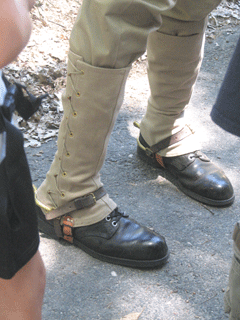
The intricate lacings of the spats of Sergeant Alizy Bowman's 9th cavalry uniform. (Photo: Melissa Frank)
MAN 2: Yeah, I figured it was a secret. He just acts the part really, really well.
WOMAN: It just makes it a much richer experience than having, you know, someone tell you about history, it gives you the feeling of experiencing history.
MAN 3: And I think the country’s probably full of stories like this if we really knew the history and the individuals who were involved in these things.
WILLIAMS: Johnson says for him, the opportunity to share Bowman’s character with park visitors is too good to pass up.
JOHNSON: I think that this story provides a cultural window. A window into another way of looking, into another way of being—that some people have never looked through that particular window. And so this provides them an opportunity to not just see another person’s point of view, but to see themselves through that other window, how they may be seen through that other window.
WILLIAMS: But Johnson believes he’s also having an impact on African-American park visitors.
JOHNSON: They come into this setting and there may be some anxiety, because it’s away from urban areas. They’re doing something that a lot of African-Americans historically have not done in terms of visiting national parks and wilderness areas. And so when they hear this story, it’s like a safe-house, or an environment of not necessarily comfort, but it gives them a sense that ‘oh we belong here, this is the place that we’ve done this work, that we helped protect. This is our park.’ And they start seeing Half Dome, they start seeing El Capitan in a completely different way, because now it’s part of the African-American experience, to be in Yosemite.
WILLIAMS: Johnson regularly does his Alizy Bowman presentation for kids of color from nearby places like Fresno, Los Angeles, Sacramento, and San Francisco. The kids come to understand that some of Yosemite’s earliest protectors faced some of the same challenges they face today. Johnson says, for him, it’s also a way to make sure the history book isn’t missing a chapter.
JOHNSON: I think that stories that are forgotten, that we pay no attention to, just fade away, like an old soldier, you know? But stories that get that attention, that engage the mind, that engage the vision, that invigorates the story, that puts blood into the story, and the story can just live and live on and live on and live forever.
[FLUTE MUSIC]
WILLIAMS: And to help ensure just that, Shelton Johnson is writing a book on the Buffalo Soldiers of Yosemite. It’ll be called “Gloryland.” He’s also been interviewed by Ken Burns for a PBS documentary on the parks. His is a rising star, and Alizy Bowman is right there rising with him.
For Living On Earth, I’m Jim Williams from Yosemite National Park.
Related link:
Yosemite Interpretive Ranger Shelton Johnson's Shadow Soldier website
[MUSIC: Monty Alexander “Buffalo Soldier” from ‘Concrete Jungle: The Music Of Bob Marley’ (Telarc—2006)]
CURWOOD: Next time on Living on Earth: for 60 years, scientists have been taking the pulse of volunteers in Framingham, Massachusetts trying to unravel the mysteries of heart disease.
LEVY: One of the reasons Framingham was good for this study is because it was so ordinary. A little cross-section of America, albeit white America. But it was just a very plain community.
CURWOOD: The Framingham Heart Study at 60. Extraordinary medical findings from an ordinary place. On the next edition of Living on Earth.
Living on Earth is produced by the World Media Foundation. Our crew includes Ashley Ahearn, Bobby Bascomb, Eileen Bolinsky, Bruce Gellerman, Ingrid Lobet, Helen Palmer, Emily Taylor, and Jeff Young. Our interns are Alexandra Gutierrez and Mitra Taj. Jeff Turton is our technical director. Alison Lirish Dean composed our themes. You can find us at loe.org. I'm Steve Curwood. Thanks for listening.
ANNOUNCER: Funding for Living on Earth comes from the National Science Foundation, supporting coverage of emerging science. And Stonyfield Farm: organic yogurt and smoothies. Stonyfield pays its farmers not to use artificial growth hormones on their cows. Details at Stonyfield.com. Support also comes from you our listeners, the Ford Foundation, the Town Creek Foundation, the Oak Foundation, supporting coverage of climate change and marine issues, and Pax World Mutual Funds, socially and environmentally sustainable investing. Pax World: for tomorrow. On the Web at PaxWorld.com.
ANNOUNCER 2: PRI: Public Radio International.
Living on Earth wants to hear from you!
Living on Earth
62 Calef Highway, Suite 212
Lee, NH 03861
Telephone: 617-287-4121
E-mail: comments@loe.org
Newsletter [Click here]
Donate to Living on Earth!
Living on Earth is an independent media program and relies entirely on contributions from listeners and institutions supporting public service. Please donate now to preserve an independent environmental voice.
NewsletterLiving on Earth offers a weekly delivery of the show's rundown to your mailbox. Sign up for our newsletter today!
 Sailors For The Sea: Be the change you want to sea.
Sailors For The Sea: Be the change you want to sea.
 The Grantham Foundation for the Protection of the Environment: Committed to protecting and improving the health of the global environment.
The Grantham Foundation for the Protection of the Environment: Committed to protecting and improving the health of the global environment.
 Contribute to Living on Earth and receive, as our gift to you, an archival print of one of Mark Seth Lender's extraordinary wildlife photographs. Follow the link to see Mark's current collection of photographs.
Contribute to Living on Earth and receive, as our gift to you, an archival print of one of Mark Seth Lender's extraordinary wildlife photographs. Follow the link to see Mark's current collection of photographs.
 Buy a signed copy of Mark Seth Lender's book Smeagull the Seagull & support Living on Earth
Buy a signed copy of Mark Seth Lender's book Smeagull the Seagull & support Living on Earth

